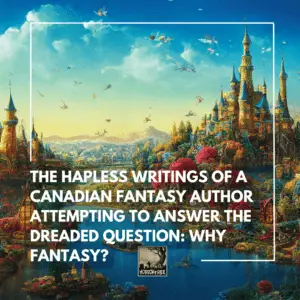Why Write Fantasy?

The Hapless Writings of a Canadian Fantasy Author Attempting to Answer the Dreaded Question: Why Fantasy?
In this, the first of a regular column series, Canadian-born, UK-based fantasy author Matthew Ducharme ponders the questions he’s asked most about the genre.
It’s a question I’ve been asked more times than I can recall, and it’s the same for every one of us genre-fiction addicts: So, why fantasy?
I can’t help the initial knee-jerk affront that comes on the heels of the question every time it’s fired my way. There’s an implicit patronisation packaged along in the snark of it; the unspoken ‘but you’re an adult’ pinned to its lapel. Sure, it’s unspoken, but we know it’s there.
Fantasy has been my favourite genre for as long as I’ve been reading. It gives me a genuine joy that (aside from perhaps science-fiction) no other genre even approaches. But (of course there’s a ‘but’), I’ve always felt like it was something I was expected to grow out of. Wizards and dragons are for kids…
…and thus, this deeply-rooted, subconscious drive to explain my affinity for the genre is born.
My defences would ram into place, and I’d answer with a shrug and a perfunctory (self-deprecating) ‘I’m a huge nerd’, ‘I grew up with it’, or something along those lines. Giving these types of answers was almost compulsive. I have my reasons, but in the face of this challenge (and we can dig into the reason I assume it’s even a challenge in the first place later…much later) they felt like nothing more than the superficial justifications of someone trying to convince themselves it’s OK to like—no, love—to LOVE this thing in question.
I love fantasy.
…And the earth was without form, and void; and darkness was upon the face of the deep…
In other genres—excluding Science-Fiction (for the most part)—the work of world building is done before the story starts. Take Sir Arthur Conan Doyle’s Sherlock Holmes, beginning for example: ‘In the year 1878 I took my degree of Doctor of Medicine of the University of London…’, and in 17 words an entire ambient backdrop has been set for the whole of the story. Yes, there are specifics in the nuance of every scene which Doyle will spice the story with liberally, but they are, essentially, already prescribed.
This is a set menu. You’re having roast beef and potatoes with gravy. Are there Yorkshire puddings? Sprouts? Parsnips? Perhaps a dollop of chutney? There might be, but those will only ever serve to enhance the meal you already know you’re having.
Now, there can be an enormous amount of excitement in nuance—the ‘spin’ on the ‘known’ will emphasise certain hidden aspects of almost anything; anywhere can be beautiful—but there will never be the level of detail required to build a world from scratch as exists in fantasy (…ahem, and science-fiction…for the most part).
A fantasy writer’s task begins weeks, months, or even years before their novel can truly take form. Where a date and location are sufficient to set the stage in other genres, in fantasy our character is likely to find themselves on a made-up street in a made-up town in a made-up country in a made-up world with made-up peoples and made-up cultures who may or may not operate on made-up laws of physics.
Oh, the possibilities…
So here, finally, we arrive at my first reason I love fantasy: the World Building.
Fantasy writers must introduce us to the world they’ve created. Fantasy—GOOD fantasy, mind—creates a suite within which the reader experiences the story as it is revealed to them. As readers, we enter a (mostly) blank room…a void, black and endless. We float for a moment on the boundless expanses of infinite possibility. A spotlight ignites, revealing some isolated view of a world of which we know nothing.
Sometimes this widening is gradual, almost gentle as it coaxes us deeper into this new land, to explore and to belong. With every word that spotlight widens, opening our eyes to the world around and the characters within. We are shown our home—as it exists in this new world, yes, but it is ours.
Other times the spotlight’s shutters open violently, thrusting us into the thick of a somewhere so alien, so turbulent that we are left shocked, scrambling frantically to find our bearings in a world we don’t understand or belong to. Our minds race to explain the fantastic (in the very literal sense of the word) as it churns out before us, digging into every line for clues to centre us in this disturbing unknown.
It’s in the feel of cold mud between my toes
For me, it’s this revelation where the magic is found. When I can hear the crunch of the hero’s boots on the gravel of the mountain path, feel the biting wind as it whips down from the peak to lash painfully at exposed skin, hear the distant rumble of an erupting volcano on the horizon and smell the acrid smoke it belches into the atmosphere, I am there. Not simply reading; I am there. I am transported into this landscape with the cast of characters I’ve come to love and respect. I travel with them.
This has bled into my everyday life so much so that I am constantly looking to recreate this feeling. I love being outside, in the elements; immersed in my world. I am confronted with senses that trigger memories of stories I’ve read and am transported back, as if experiencing them for the first time again.
The Lord of the Rings set this in motion for me. I’ll never forget the complete, almost overwhelming immersion I experienced as the Hobbits left the Shire. In the night they made Bree, as the rain poured down on them and their fear growing, I could feel the soak of their clothes, the squelch of their bare feet in the muddy road and smell the wet muck as they churned it up with every step.
And so, I search constantly for the return to those pages.
In my world (the real world) I like to run in the woods—better still when it’s raining, or has just rained; when the trails are a sodden mess (and an injury-waiting-to-happen, some will say). I don’t even know if I particularly enjoy running, but when my feet press down into the mud, stirring up the smell of clean decay, dirt, and the unmistakable tingle of ozone in the air, it begins. When the rain runs down my face in rivulets, and soaks through my clothes to chill my skin, I feel like the Hobbits are with me. My panting breath, elevated heart rate and burning lungs echo with theirs as they—WE—as we flee desperately from the ever-gaining Black Riders we know are behind us somewhere in the darkness.
I am no longer running through the safety of the woods near my home in Surrey, England; I am in Middle Earth and I am in danger.
This takes place time and time again. The most recent books I’ve read; The Broken Earth series by N. K. Jemisin, are a masterpiece of world building, but from a completely different angle. Jemisin approaches this at a macro level. Her world is vast, and her construction is immense, but while she does not dwell in the nuance of the feel of the world, she dives deeply into the experience of it.
In her world, the reader is left to insert many of the minute details, but this does nothing to diminish the feel. In fact, it allows the reader to tailor that, based on their own past experiences.
Trust me, you’ll like it…but you’ve got to do some of the work
Fantasy creates entire worlds, but no matter how well it’s done, a reader who isn’t convinced will never appreciate it. This is ultimately on the writer, but requires a reader’s assistance. This comes by way of the willing suspension of disbelief. Fiction is a lie. We all know it, and as readers, we are complicit. We agree to pretend this lie is true for the sake of our entertainment.
I know of—and I’m sure many of you do too—people who simply can’t suspend their disbelief beyond a certain point. To some, it’s just too much of a stretch to accept a world in which physics are applied differently, or where impossible creatures walk the earth.
I call bullshit.
Unless they only read non-fiction (and if they do, fear them deeply), they’re already doing it—just to a lesser extent.
Even the most realistic literary fiction, set in the most mundane town demands the reader to ignore the fact that they know the characters and events are—wait for it—MADE UP! Fantasy just takes this a step (or, admittedly, often several steps) further.
And for me the full immersion into the world of an epic fantasy allows for the richest reading I’ve ever found. It can be for you too—but you’ve got to put in the work.
Join me and the British Fantasy Society (BFS) on the 18th of February for a day-long online event where we’ll dive deeper into the topic of World Building with authors, publishers and agents on a number of panels, readings and interviews. For more information on this and future BFS events, follow this link: https://www.britishfantasysociety.org
Hope to see you there.
- About the Author
- Latest Posts
Matthew Ducharme is a Canadian-born fantasy author living in Surrey, England. He also has superpowers – that is, he’s neurodiverse. Equal parts super-help and super-hinderance, his ADHD-riddled mind makes every day an adventure. Convinced he was stupid as a child, over time he learned to navigate his own chaotic mind. Now channelling his energy successfully,
Matthew enjoys little more than exploring the seemingly limitless expanse of his creativity.
His epic fantasy series (currently querying) was started during the pandemic to give his overactive mind an outlet on the long, quiet stretches. He also dabbles in other forms and genres, but fantasy is his true love. To pursue that further, he’s on the committee of the British Fantasy Society.
Competing for true love honours: his work in the cruise ship industry, which takes him around the globe; his tabletop gaming; the outdoors (archery, mountain biking, fishing, and more); and his wife and two cats (the little furballs hate when he focuses on writing, instead of them).
Check out his landing page here.













